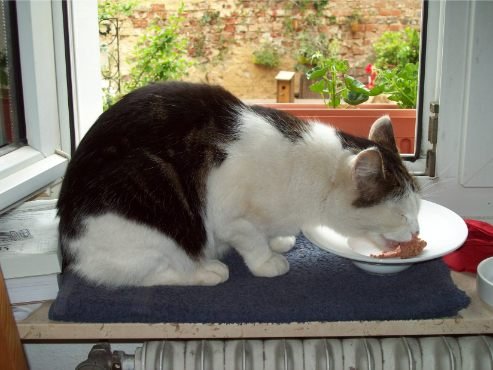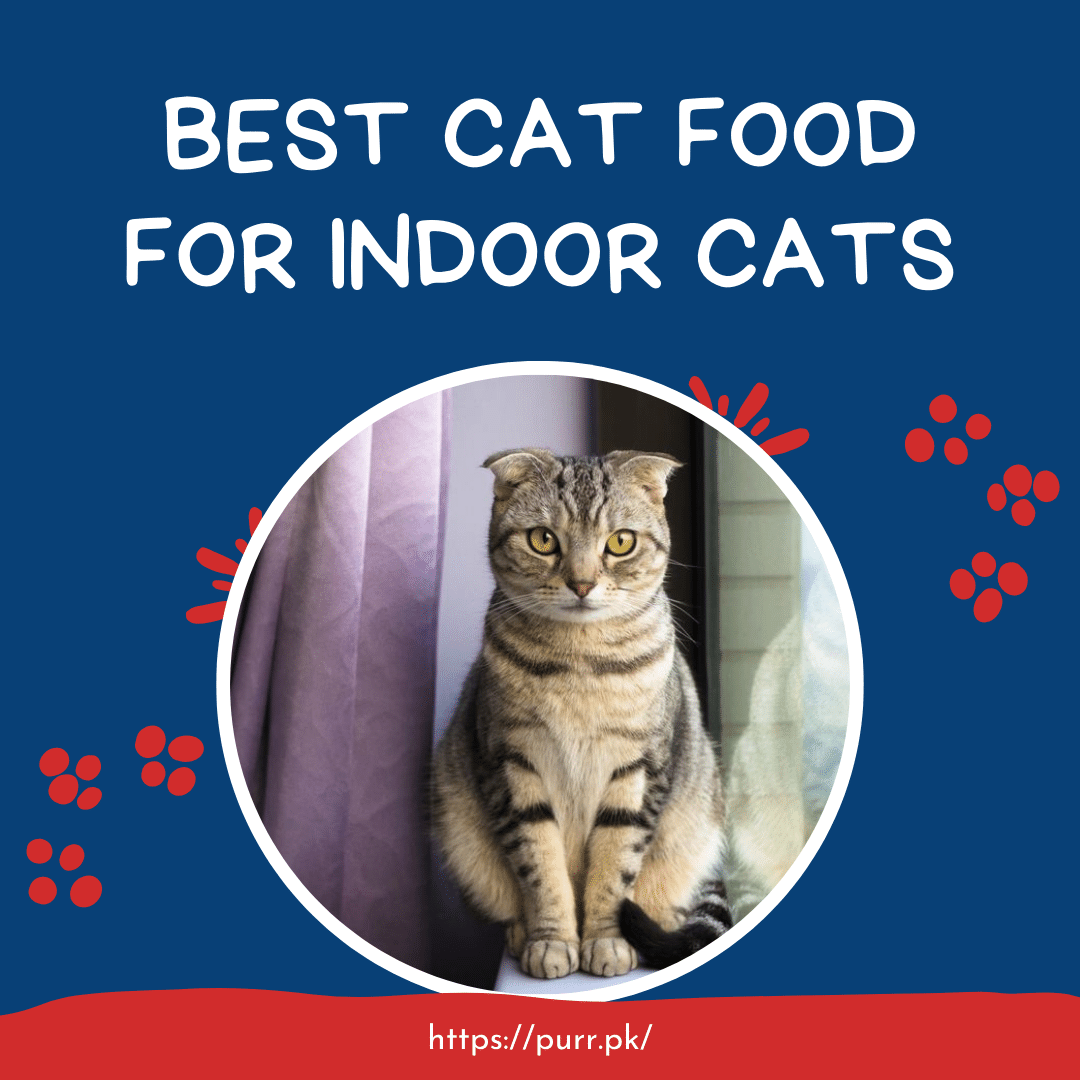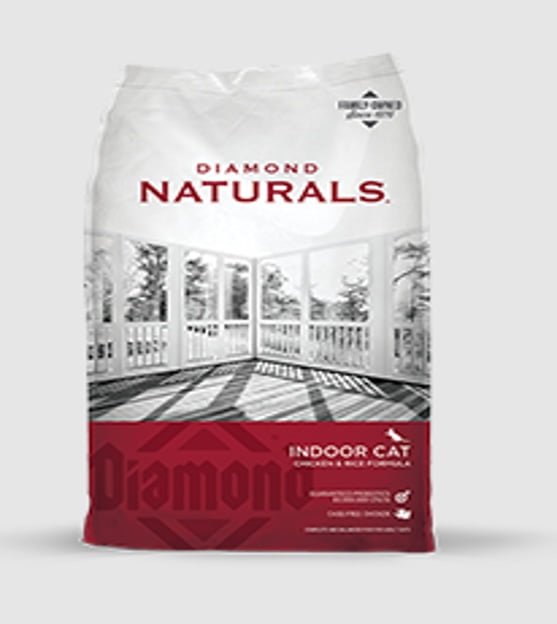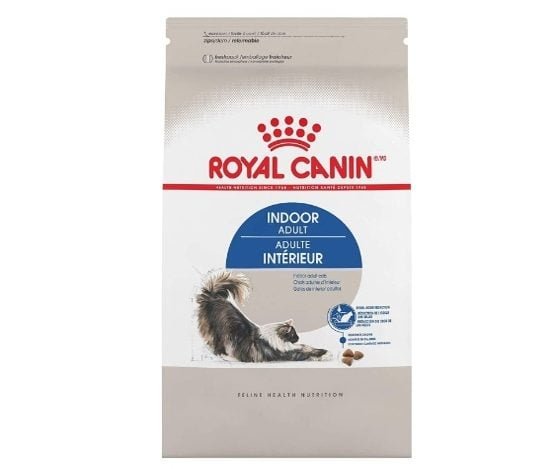Indoor cats typically lead less active lifestyles than their outdoor counterparts and are at a higher risk for obesity. Indoor cat food is specially formulated with fewer calories to match their lower energy expenditure. Additionally, it often contains specific nutrients to aid in hairball control and support urinary health, addressing common issues faced by indoor cats.
Many cat parents in Pakistan don’t care about such significant details about their pets. Hence, the cats suffer a lot. We love our cats, and we know you love them too. This guide reviews the 5 best cat foods for indoor cats in Pakistan.

Important: Please note that some of the foods reviewed below may not be available in Pakistan due to import restrictions.
4 Best Cat Foods for Indoor Cats in Pakistan
Reflex Plus Cat Food Hairball & Indoor with Salmon
Reflex Plus Hairball & Indoor with Salmon cat food is designed to meet the specific nutritional needs of indoor and long-haired cats over 12 months old, focusing on hairball control and optimal health. This super premium dry cat food is made with high-quality salmon as the primary ingredient, offering a rich source of animal protein that comprises 92% of the protein content in the food.
The inclusion of xylo-oligosaccharides (XOS), a type of super prebiotic derived from corn cobs, aids in improving intestinal flora, thereby enhancing digestion and metabolism of nutrients, and supports the immune system through its natural antioxidant effects. The formula is balanced with a comprehensive mix of vitamins, minerals, and other essential nutrients like Vitamin A, D3, E, and C, as well as Taurin for heart health, and L-carnitine, which contributes to weight management.
The presence of psyllium and natural fibers helps in hairball control by facilitating the passage of ingested hair through the digestive tract, and omega 3 & 6 fatty acids promote healthy skin and a shiny coat. This diet is formulated to reduce the likelihood of obesity and digestive issues common in less active, indoor cats, making it a nutritious option that caters to their specific lifestyle needs.
Diamond Natural Indoor Cat Food
Diamond Naturals Indoor Cat Food is formulated to cater to the nutritional needs of indoor cats, emphasizing high-quality protein sources, digestive health support, and optimal nutrient absorption. The primary ingredients include chicken meal and chicken, offering a rich source of lean protein essential for muscle growth, skin, and coat health, and overall well-being. The food also incorporates highly digestible carbohydrates like ground white rice and complex carbohydrates from cracked pearled barley, providing energy for your cat. Essential fatty acids are supplied by ingredients like chicken fat and flaxseed, promoting healthy skin and a shiny coat.
This cat food is enriched with various superfoods, including kale, pumpkin, blueberries, and chia seeds, which contribute vitamins, minerals, and antioxidants to support overall health. It includes a blend of natural fibers like ground Miscanthus grass to support digestive health and regular bowel movements, and probiotics to aid in maintaining a healthy gut flora.
Royal Canin Indoor Adult Dry Cat Food
Royal Canin Indoor Adult Dry Cat Food is specifically tailored for indoor adult cats, focusing on their unique nutritional needs. This formula aims to address common issues faced by indoor cats, such as hairball management and fecal odor control, by incorporating a high fiber content that supports digestive health. The controlled calorie content helps maintain an ideal weight, important for less active indoor cats. Additionally, the food supports oral health by slowing down the formation of tartar.
However, it’s noteworthy that this formula might not be suitable for outdoor cats due to its specific nutrient composition designed for a less active lifestyle. The main ingredients include chicken meal, corn, and rice, with added benefits from pea fiber, beet pulp, and a mix of vitamins and minerals to support overall health. Despite some concerns over ingredients like wheat gluten and preserved chicken fat, the overall customer experience has been positive, with many noting improvements in their cats’ digestion and stool quality.
MERA Finest Fit Indoor Cat Food
MERA Finest Fit Indoor Cat Food is tailored to meet the specific needs of indoor cats, offering a well-rounded diet that addresses their unique lifestyle. The food is formulated with fresh meat, rice, and other valuable ingredients, ensuring an optimal supply of nutrients. Notably, it includes a wheat-free recipe, incorporates an anti-hairball complex, and is enriched with fresh poultry meat and forest fruits for a comprehensive nutritional profile. The absence of wheat, exotic meat sources, colorings, flavors, preservatives, genetically modified ingredients, sugar, soy, and vitamin K3 in its formulation highlights its focus on natural, wholesome nutrition.
This cat food is designed to cater to the reduced physical activity of indoor cats, with easily digestible ingredients that provide the right energy content. The inclusion of special fibers helps to prevent hairballs, a common issue for indoor cats who groom themselves frequently. Additionally, a specific blend of minerals aims to reduce the risk of urinary stone formation, reflecting a holistic approach to cat health.

Things to Consider Before Buying Indoor Cat Food
Low Calorie Count
Indoor cats typically lead a less active lifestyle than outdoor cats, making them more susceptible to weight gain and obesity. Choosing cat food with a lower calorie count helps you manage weight effectively. A reduced-calorie diet supports maintaining an ideal weight, preventing health issues related to obesity, such as diabetes, arthritis, and liver disease.
Protein Source and Quality
Cats are obligate carnivores, requiring high-quality animal protein for optimal health. The protein source in cat food should be primarily from meat, fish, or poultry. High-quality protein supports muscle maintenance and overall health, providing essential amino acids that cats cannot synthesize on their own. It’s crucial for the development and repair of body tissues and the proper functioning of the immune system.
Low Carbohydrate Count
Cats have a limited ability to digest carbohydrates, which are often used as fillers in cat food. A diet high in carbohydrates can lead to weight gain and may contribute to diabetes. Opting for cat food with a low carbohydrate count ensures that your cat’s nutritional profile is closer to its natural dietary needs, emphasizing more on proteins and fats as primary energy sources.
Moisture Content
Proper hydration is vital for indoor cats, especially since they may have a lower drive to drink water. Wet cat foods or dry foods with higher moisture content can help maintain adequate hydration, supporting kidney and urinary tract health. A diet with sufficient moisture can prevent urinary tract diseases, which are common in cats.
Added Fiber Sources
Fiber plays a significant role in an indoor cat’s diet, aiding in digestion and helping to prevent hairballs by moving hair through the digestive tract. Foods with added fiber sources, such as beet pulp or inulin, promote a healthy gut, facilitate better stool quality, and contribute to satiety, helping control weight by making cats feel fuller.

Frequently Asked Questions
Is dry or wet food better for indoor cats?
Dry food is convenient and helps maintain dental health by reducing tartar buildup. Wet food provides more moisture, which is beneficial for hydration and mimics a natural diet. A combination of both can offer a balanced diet for indoor cats.
How much should I feed my indoor cat?
The amount varies based on the cat’s weight and activity level, but an indoor cat should generally be fed between 20 and 30 grams of dry food per kilogram of body weight per day.
How do I prevent my indoor cat from getting obese?
Prevent obesity in indoor cats by providing portion-controlled meals, engaging them in daily physical activity, and avoiding excessive treats. Monitor their weight regularly and adjust food intake accordingly.
Can indoor cat food help my cat lose weight?
Yes, indoor cat food formulated for weight control with lower calories and higher fiber can help a cat lose weight when fed in controlled portions alongside regular exercise.
Which ingredients should I avoid when buying cat food for indoor cats?
Avoid cat foods with high grain content, artificial preservatives, colors, flavors, and by-products. Prefer high-quality protein sources and natural ingredients.
How to switch an indoor cat to a new food?
Transition your indoor cat to new food gradually over 7-10 days, mixing increasing amounts of the new food with the old to avoid digestive upset.
What is the best homemade diet for an indoor cat?
A balanced homemade diet for an indoor cat includes cooked or raw meats, organs, a small amount of vegetables, and supplements to ensure it meets all nutritional needs. Consult a veterinarian for a recipe that suits your cat’s health requirements.




